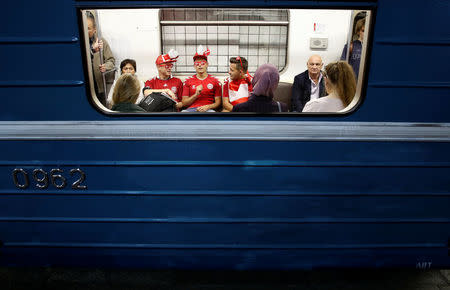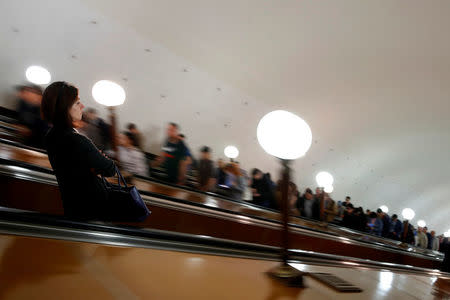'Let's hang out!': Friendly Russians revel in influx of visiting fans
By Alexandra Ulmer and Jack Tarrant VOLGOGRAD/SAMARA, Russia (Reuters) - Russians in World Cup host cities – some of them remote or industrial towns where tourists rarely tread – are bending over backwards to help visiting soccer fans, dispelling some preconceptions and spreading an upbeat atmosphere throughout the tournament. From helping fans navigate public transport to translating Cyrillic restaurant menus, Russians appear to be reveling in the short-lived influx of fans despite previous fears that racism or xenophobia could tar the 2018 World Cup. "My wife was not keen at all. And at work, people were telling me it wasn’t a good idea," said Scott Bastick, a Scottish insolvency expert who was at the Germany v Mexico game with his 10-year old son. "But it's been really, really pleasant. People are helpful, just in the street, and we're managing to get around OK.” Bastick's comments were echoed by tourists and several players at Russia's 11 host cities, where no major incidents have so far been reported. President Vladimir Putin, greeted by a huge cheer ahead of the hosts' opening game against Saudi Arabia on Friday, spoke of showing the world a hospitable Russia and of sport overcoming differences. Nevertheless, some critics fear a successful tournament could play into Putin's hands. Moscow has a pariah image in much of the West due to Russia's backing for Syria's Bashar al-Assad and for its annexation of Crimea in 2014, and due to accusations of human rights violations at home. To be sure, some fans chose to sit out this World Cup, worried about potential homophobia, hooliganism and racism. England defender Danny Rose, for instance, told his family not to come to Russia because he feared they could be racially abused. But so far, positive personal stories appear to be taking the forefront. Slim Jatlawi, a Tunisian fan, and his friend struggled to find a taxi after landing in Volgograd around midnight on Saturday until a Russian man – 44 year-old local Grigory Volg, who was smoking a cigarette outside the airport – offered to drop them off at their hotel. "He insisted. We offered him money, but he said no. He helped us with our luggage and spoke with the receptionist at the hotel. I worked as an airline steward during five years and I've never seen anything like it. It was magnificent," said Jatlawi, 31, a BMW salesman based in Qatar. Jatlawi's experience with Volg was by no means a one-off. "Everyone is so nice. They're all asking me for my number and saying 'Let's hang out tomorrow if you're free.' I think they're happy to have some tourists," said Jatlawi, decked out in a red and white Tunisian national shirt. NEW FRIENDS Indeed, Volgograd, a solemn city best known for being the home of the Battle of Stalingrad - the bloodiest battle of World War Two - is not exactly on the tourist map. "The World Cup is a big event for me," said Volg, who was attending the Tunisia v England game with his new friend on Monday. “For me it's a chance to talk to new people. I have no idea what kind of image of Russia anyone has, but I don't think Russia's image is that bad." One Russian World Cup volunteer in Volgograd, however, said she was striving to show the world that Russia was not about "gloom and bears." Players are also feeling the love as Russia rolls out the red carpet. "Obviously you hear a lot of things about Russia in the media and what-not but coming here into a city like Kazan, which isn't a major city here, and just walking out onto the street and seeing that it's still very beautiful and very scenic place," said Australia's Daniel Arzani, the youngest player at the tournament. "It was a little bit surprising but also pleasant." To be sure, a good time at the World Cup is no guarantee that tourists will trickle back to Russia. But many will be returning to far-flung corners of the globe with positive memories. "Russia is not like what I saw in Hollywood movies or the news," said Indonesian teacher Ahmed Hanafi as he bought souvenirs of Volgograd on a sunny afternoon by the wide Volga river. (Additional reporting by Andrew Osborn in Volgograd, Ian Ransom in Kazan, and Alastair Macdonald in Moscow; Editing by Hugh Lawson)



